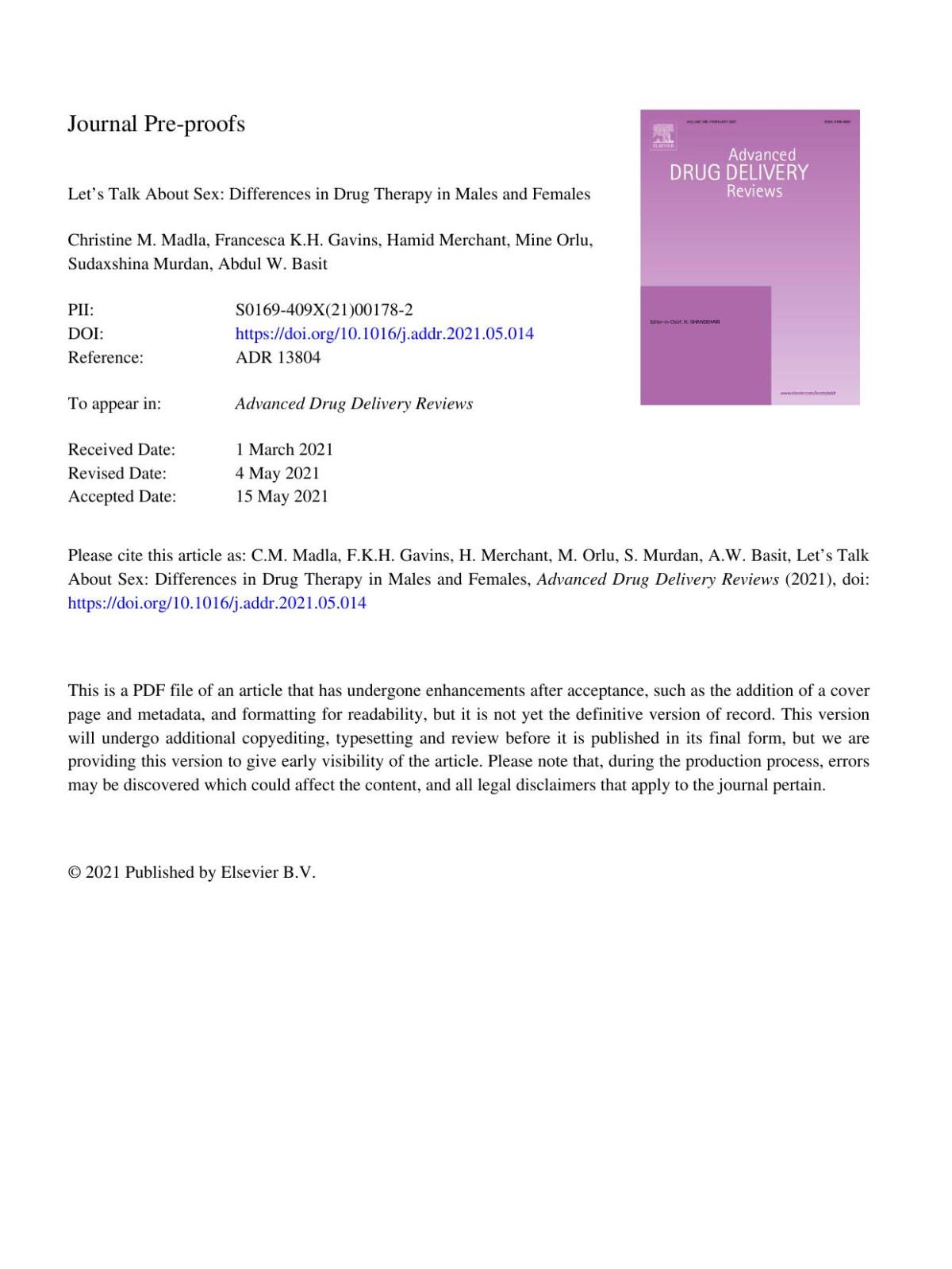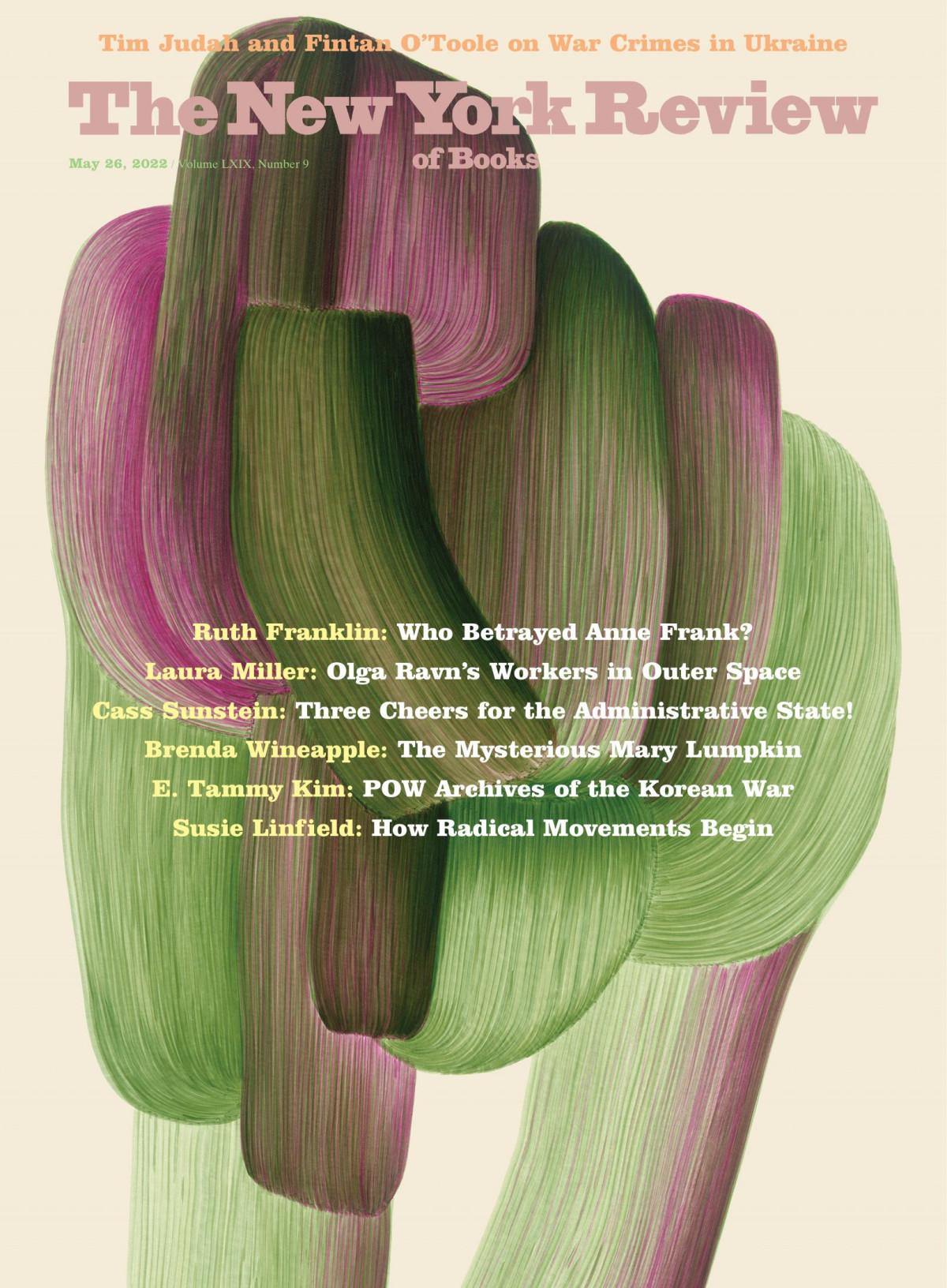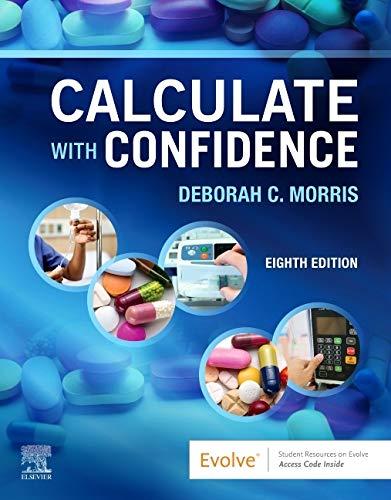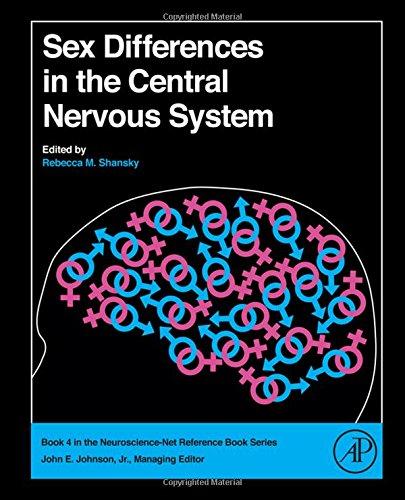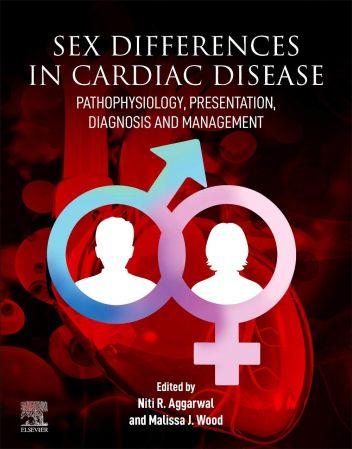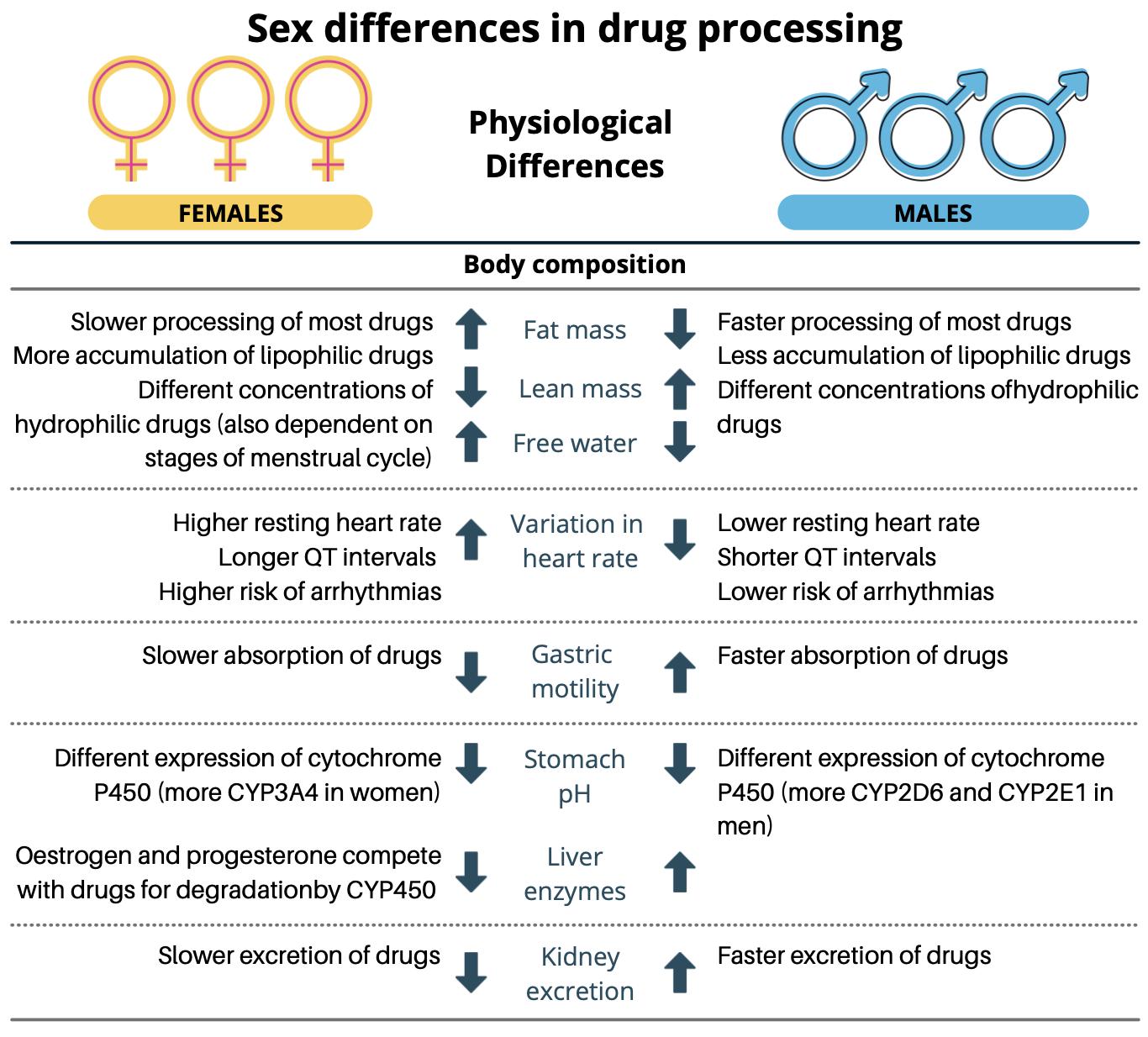1.0 Introduction
In general, women are prescribed more drugs than men, require increased access to health care services but suffer from more adverse drug reactions (ADRs) and are hospitalised more often due to ADRs than men (even when adjusted for age-related differences) [1]. The lack of consideration of potential sex differences exists in nearly all areas of research and development and has seeped into the mainstay of society. For example, research from van Hoof et al. observed that office building thermostats are based on male metabolic rates with temperatures set too low for many women [2]. Some consequences, however, can be life threatening. In engineering, many devices and machines have been designed to fit male bodies; military and commercial cockpits were traditionally based on male anthropometry. As a consequence, it was potentially dangerous for some women or small men to become pilots [3]. Appropriate female representation has vastly been ignored in scientific research including immunology, pharmacology and neuroscience. Interestingly, in the preclinical field of behaviour and reproduction, sex as a biological variable is of particular interest [4].
Our cells are innately infused with sex differences that cannot be ignored. The phrase “every cell has a sex” captures the essence of how fundamentally different men and women are when it comes to health and disease (Figure 1a). In fact, every nucleated cell has a sex containing the sex chromosomes (in its simplest form, XX in females or XY in males [5]). A femalepredominance to chronic disease is seen in epidemiology, pathology, clinical course and diagnosis of Alzheimer’s disease, influenza and pneumonia to name a few (Figure 1b). The onset and development of heart disease, specific cancers and chronic pulmonary disease, however,areleadingcausesofdeathinmen[6].InlightoftheCOVID-19pandemic,theglobal number of confirmed cases, severe symptoms, differing immune response and mortality rate due to the disease are higher among men [7-10] However, recent epidemiology data from the COVID Symptom Study application revealed that women were more likely to develop “long COVID” where symptoms persist for longer than 12 weeks [11].
In biomedical research, women and non-human female mammals have often been underrepresented. Although there is some recognition today of the need for appropriate female representation in clinical trials, in previous decades, the consideration and inclusion of males overshadowed females in clinical research design and conduct. Figure 1c demonstrates a male
bias in articles involving interdisciplinary research including biology, neuroscience, physiology,pharmacologyandbehaviour.Females,however,werethesexofinterestinsubject areas spanning reproduction, endocrinology and behavioural physiology [4]. Although Figure 1c outlines the employment of both sexes, it is clear that results are seldom disaggregated according to sex which can potentially skew or even conceal sex-specific differences in biomedical research (Figure 4) [4]. The leading assumption is that i) results from male studies appropriately apply to females or ii) hormonal cycles decrease the homogeneity of study populations and complicate experimental designs to such an extent that it may not be worth studying females from the outset [4]. In addition, the risk of adverse effects such as teratogenicity outweighed other considerations and thus, females of child-bearing potential were largely excluded from clinical trials [12]. In some cases, little evidence exists for the safety profiles of drugs in pregnant or breastfeeding females, therefore such females and their healthcare professionals are advised to consider the risk-benefit ratio of therapeutic use. The COVID-19 vaccination programme is such an example [13]. In addition, when studying diseases prevalent in both sexes, Caucasian males were considered to be the typical study population [14] highlighting the lack of consideration of potential ethnic differences too [15].
To address the historical overrepresentation of male subjects in biomedical research, a 10-year follow-upstudyofsexinclusionacrossinterdisciplinaryresearchwasconductedbyWoitowich et al. [16]. The work identified that there was a significant increase in the number of studies that included both sexes across general biology, immunology, neuroscience, physiology, pharmacology, endocrinology, reproduction, behavioural physiology and behaviour. However, in all subject areas bar pharmacology, there was no change in the proportion of studies that included data specifically analysed by sex. In addition, the studies failed to provide rationale for single-sex studies or the lack of sex-bases analyses outlining a clear sex gap in biological research disciplines [16].
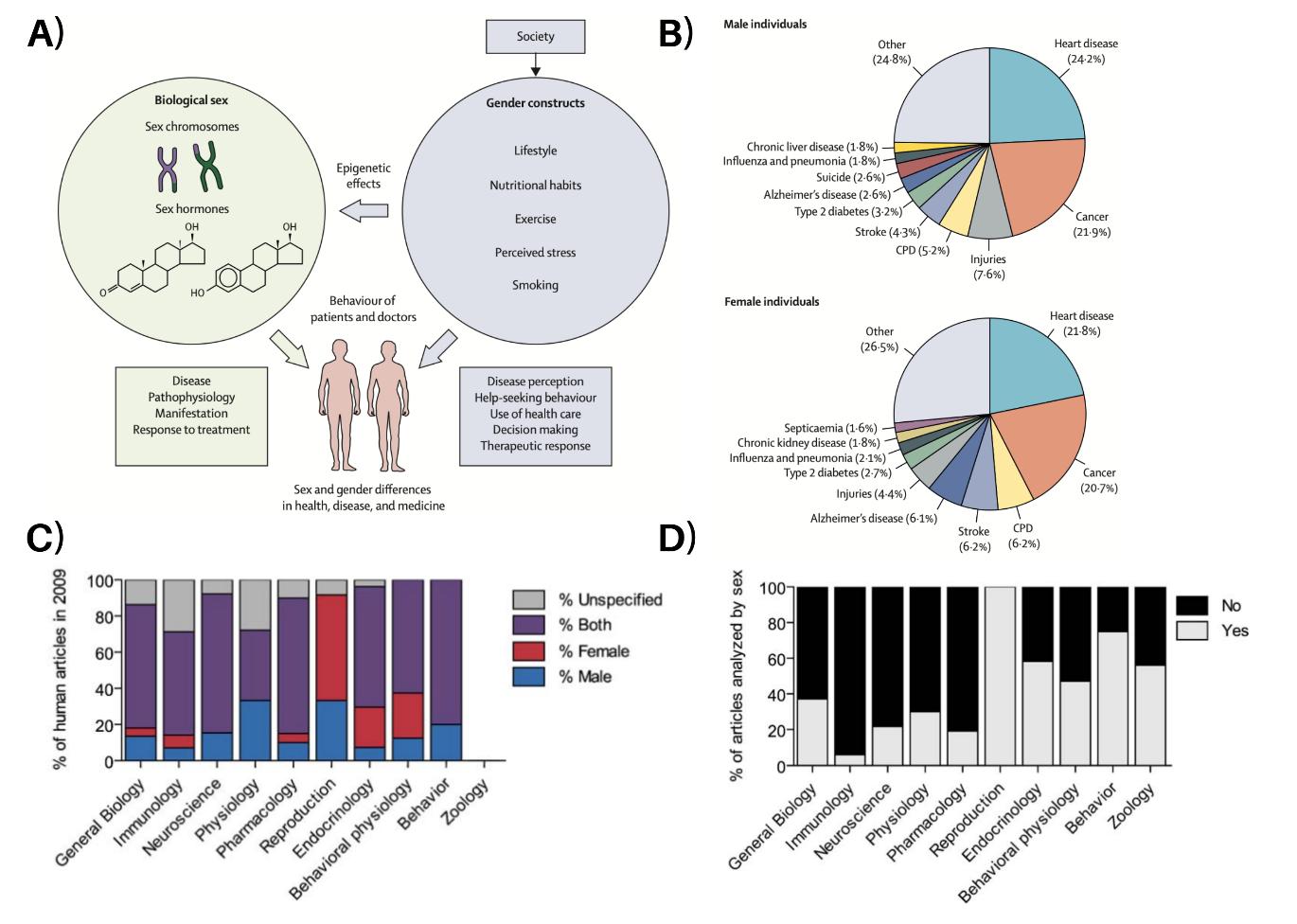
Figure 1. Sex as a biological variable as modifiers of health, disease and research outcomes. A) Inter-relation between biological sex and societal gender in health, disease pathophysiology and clinical manifestations. B) Distribution of the ten leading causes of death disaggregated by sex in the US in 2017. (CPD = chronic pulmonary disease). C) Percentage of articles that used male subjects, female subjects, both male and female subjects or did not specify sex of sample population. D) Percentage of articles disaggregating pre-clinical animal results according to sex in different scientific disciplines. Adapted with permission from [4] and [6].
To clarify nomenclature, this review will go forward with ‘sex’ and not ‘gender’ in its terminology. Sex refers to the biology of living things, i.e. as male or female according to reproductiveorgansoffunctionsbasedonthechromosomalcomplement[5].Gender,however, refers to sociocultural attributes, behaviours or personal identification [17]. As such, this review will comprehensively report on how the lack of pharmaceutical analyses considering sex differences in systems biology, sex-specific needs and behaviour, regulatory affairs and post-marketing surveillance has led to a disparity in optimum drug development. As peroral administration is the main route of drug delivery due to convenience and consequently patient medicine adherence [18], a key focus is dedicated towards sex differences in the gastrointestinal (GI) tract and drug absorption in male and female human adults or equivalent preclinical models. Recommendations will also be proposed on how scientists should rethink standards and reference models across the drug delivery pipeline with the aim to integrate sex analyses into research and innovation.
2.0 Sex bias in pharmaceutical research
Government reports from 1980s to 90s indicated that women had lower representation in federally funded studies investigating diseases that affected both sexes [19-22]. In 1992, the United States of America’s Food and Drug Agency (FDA) and Food and Drug Law Institute concluded that young women needed to be included in clinical trials in order to understand female response to pharmaceuticals [12]. The regulation and guidance published by the FDA on female participation in industry-sponsored clinical trials has transformed over the half century, instigated by the thalidomide tragedy in pregnant women [23]. Thalidomide was developed by the Swiss company CIBA in 1953 and introduced to the pharmaceutical market in 1956 by German pharmaceutical company, Chemie Grunenthal [24]. Initially marketed with the brand name Contergan, thalidomide was prescribed as a non-barbiturate sedative to induce deep sleep. Pre-clinical testing, however, failed to establish a median toxic dose and the drug was believed to be non-toxic to humans [25]. In that era, testing for harmful teratogenic effects were not considered. The drug was used as a sedative but soon became popular for its antiemetic effects in pregnant women suffering with morning sickness [26]. In 1961, observations linked thalidomide use in pregnancy to congenital malformations in multiple cases worldwide [25, 27], and thalidomide was ultimately withdrawn from the pharmaceutical market in the same year.
In 1977, a guidance document from the FDA advised that women of child-bearing potential (females capable of becoming pregnant, including pre-menopausal single abstinent women, women using contraceptives or women with sterile partners) should be excluded from Phase I and early-Phase II trials. If a drug was deemed to have a positive risk-benefit ratio, women could then be included in late-Phase II and Phase III trials providing animal teratogenicity and fertility studies were completed [20]. In 1993, however, the FDA reversed the 1977 FDA guidance which lifted the ban on women of child-bearing potential to be excluded from early clinical trials research. The guidance further specified that clinical trial participants should be representative of the patient population likely to be prescribed the drug once regulated for market approval [20]. In the same year, the National Institutes of Health (NIH) formalised an NIH Revitalisation Act entitled Women and Minorities as Subjects in Clinical Research where four main issued were addressed; 1) Women and minorities are to be included in all clinical research, 2) Numbers in Phase III clinical trials be sufficient to allow for valid analyses of potential sex and ethnic differences, 3) Such groups should not be excluded due to trial costs and, 4) Programmes and support outreach efforts should be created to enrol women and minorities in clinical trials [28]. Although progress has been made towards the appropriate representation of females across the whole clinical arena in the last decade (Figure 2), sex differences in drug response are still demonstrated following regulatory approval and entry of a drug into market [29].
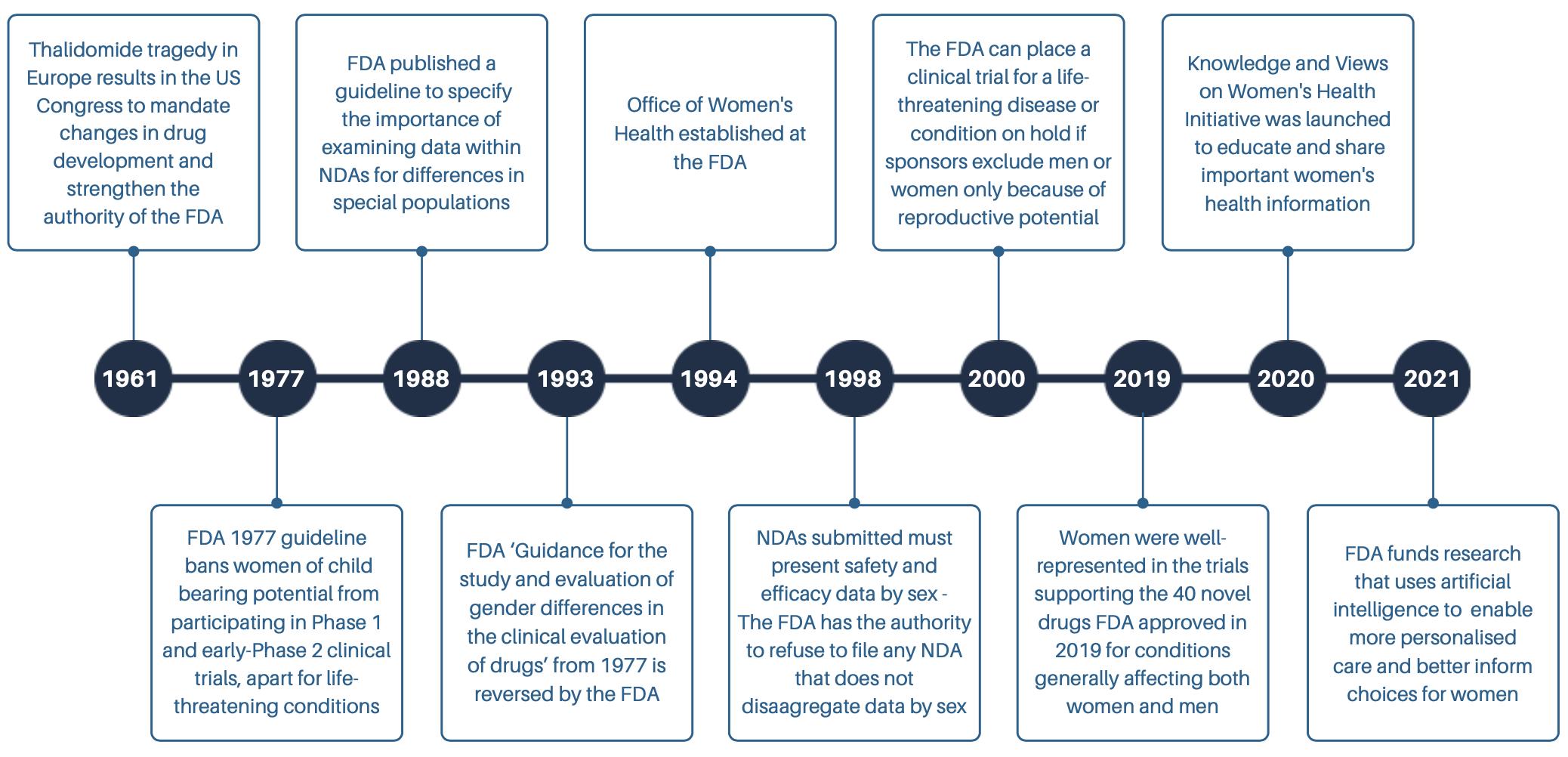
Figure 2. Significant events in the history of female participation in clinical trials in the United States in line with guidelines from the US FDA.
Adapted from [30, 31].
A 2018 review of 107 NIH funded randomised control trials that enrolled both men and women found that only 26% reported even one outcome disaggregated by sex or included both sexes as a co-variate [32]. 72% simply did not include sex as a factor in their analyses. NIH policies mandated over a quarter century ago have yet to yield the intended increases in reporting by sex. A consequence of this sex inequality hides in plain sight today: most drugs are prescribed to women and men at the same dose. Many currently prescribed drugs were approved by FDA prior to 1993, with inadequate inclusion of female animals in preclinical research and of women in clinical trials [33]. The existing knowledge base on sex-aware prescribing lacks information on sex differences for one-third of all drugs [34, 35]. Pharmaceutical companies responsibleforgeneratingpre-approvaldataoftenfailtoincludeinformationonsexdifferences in New Drug Applications (NDA) documents, and the FDA has previously failed to enforce its own requirements before approving new drugs [36]. Consequently, potential sex differences in pharmacokinetics, pharmacodynamics and their relation to adverse side effects often remain unknown. Most of the data submitted to the FDA by drug companies are not publicly available and not subject to peer-review by the broader scientific community [35]. Regulatory agencies have historically paid insufficient attention to differences between women and men in terms of both sex and gender which perpetuates inequalities by neglecting drug safety problems that are sex-specific.Inaddition,thisdisparityallowsformisleadingdrugmarketing[36].Forexample, irritable bowel syndrome (IBS) is disproportionately diagnosed in females, despite recent evidence that males equally both suffer and access health advice for IBS symptoms [37, 38].
Tegaserod was approved for IBS in females first, followed by a FDA-approved extension to males for chronic constipation based on two clinical trials with over 85% females participants [39, 40]. Tegaserod was later removed from market following a meta-analysis of 29 trials reporting an increased risk of cardiac adverse events [41].
In the preclinical arena, routine in vitro models, namely cell lines, are not sufficient to study and understand sex differences in early drug development as the cells are often derived from a single animal or human subject to reflect a specific organ. The sex of cell lines is often not reported, failing to acknowledge potential sex differences in the in vitro mechanisms. To overcome these shortcomings, scientists should state the sex of their in vitro models in their publications. Cvitanovíc Tomaš et al. have created a computational model LiverSex [42], taking sex differences in the liver into account, adapted from SteatoNet in silico model [43].
Data from oestrogen and androgen receptor responses are included which includes sex-related effects on growth hormone release. Currently, the model has been validated in mice but not in
humans. A step further, Thiele et al., have created two validated, sex-specific, whole body metabolic models called Harvey and Harvetta [44]. Here, the male and female physiologies have been represented with 20 organs, 6 sex organs, 6 types of blood cells, the systemic blood circulation, the blood-brain barrier and the GI lumen, including the microbiome. These sexspecific models represent systems biological approaches to precision medicine.
3.0 Sex differences in human physiology
Men Are From Mars, Women Are From Venus by John Gray in 1992 outlined that differences in communication tactics between males and females stem from fundamental differences in psychological processes between the sexes. Indeed, such sex differences are not limited to psychology but extend to the complete physiological system and anatomy itself. For many years - except for studies related to the physiology of reproduction - physiological principles containedinclassicalphysiologicalandmedicaltextbookshavebeenbasedontheandrocentric model of 70 kg healthy Caucasian males between 18 to 40 years of age [45]. In addition, thousands of genes differ in their expression between males and females in the liver, adipose tissue and muscle with the brain being less sexually dimorphic [42]. The appreciation of this led to the US Institute of Medicines declaring in 2001 that biological sex will considerably affect the course and prevention of disease [46].
Significant physiological differences exist between men and women such as percentage of body fat, body water volume, plasma volume and organ blood flow, in addition to body weight (Figure 3). As such, women are not small men. These parameters, however, are often overlooked in the drug development process and can consequently lead to differing response to medicines [15]. These have been reviewed elsewhere [47, 48], however herein, focus will be invested towards sex differences in the processes involved following solid oral drug administration, i.e. the GI tract.
Figure 3. Physiological differences in males and females that can affect drug processing. Adapted with permission from [49].
3.1 Sex differences in gastrointestinal physiology and the influence on oral drug performance
There are significant sex-specific differences in terms of drug bioavailability and pharmacokinetics which can, in turn, differentially affect drug efficacy and safety. Underlying reasons for sex-related variations in drug performance include obvious differences in physiological parameters such as body fat content and hormonal control [50]. Fundamental differences at the level of the GI tract, liver and kidneys can further influence drug absorption, distribution, metabolism and elimination, and consequently lead to variability in drug therapy and potential toxicity [51]. It is difficult to envisage that differences in drug performance and adverse effects are linked to a single pharmacokinetic parameter and governed by a single
organ. Instead, it is much more likely that sex differences may be a result of the interplay of the complete system following oral drug administration. Herein, focus on the GI tract, potential differences between the sexes and its influence on oral drug variability will be discussed.
Tissue exposure of orally administered medication is affected by variability in gastric fluid pH and volumes, gastric emptying time (GET) and intestinal transit time (ITT), competition and/or regulation of intestinal transporters and drug metabolising enzymes, and the potential interactions of sex steroids on drug PK [52] (Figure 4). In terms of gastric and small intestinal fluid volumes, males have been reported to have higher volumes than females [53] which may affect the extent of drug dissolution. Average fasted gastric pH is significantly higher in females (2.79 ± 0.18) than in males (2.16 ± 0.09) (p < 0.05) which may be attributed to reduced acid secretion due to the smaller stomach size seen in females [54]. The basal acid output in the fasted state was nearly half in females than in males, 2.1 ± 0.2 and 4.0 ± 0.2 mmol/h, respectively [55]. Lowered gastric acid secretion may influence drug ionisation, particularly of weak bases, the solubility of pH-sensitive drugs and the degradation of acid-labile drugs, thereby affecting absorption and consequently, oral drug bioavailability. Sex differences have also been reported in bile acid composition with higher concentrations of cholic acid being reported in males and higherconcentrations of chenodeoxycholicacidreported infemales [56].
Another random document with no related content on Scribd:
equanimity. It then occurred to me that he would assuredly soon find us out; but he did not. I sat there in vain. The people never before seemed so dull and stupid. The rooms never were so hot. I longed for mama to fetch us away.
"At last he did condescend to approach us and ask us some trivial questions, which irritated me so much that I hardly deigned to answer him. He did not seem in the least surprised by my behaviour; and that made me angrier. It was quite a relief to me when he turned round to speak to some one and went away.
"I don't understand it at all. I suppose I have been making a little fool of myself; yet, in spite of his rudeness—no, not rudeness, but—what shall I call it?—I should like to see him again. His mother has purchased the Grange, so when we are at Wyton, we shall perhaps see a good deal of him, and I shall then be able to understand him."
CHAPTER VIII.
MRS. LANGLEY TURNER, AND HER FRIENDS.
While Rose was writing the foregoing letter, Mr. and Mrs. Meredith Vyner were driving towards Eaton-square, on a visit to the well-known and well-worth-knowing lively widow, Mrs. Langley Turner.
London society abounds in subjects curious to the observer; and, in spite of its general uniformity, is so split up into opposite and opposing sections, that a painter of manners, whose observation had been confined to a few of those sections, would be accused of ignorance or of caricature by nine-tenths of the English public. This is the reason of the numerous failures in the attempt to describe English society, both by natives and foreigners. To foreigners, indeed, the task must be hopeless. How should
they avoid taking their standard of the whole from the circle in which they move? They see the interior of houses where wealth, talent, political influence, and sounding names meet together in habitual and familiar intercourse: how can they imagine that what they see there are not the acknowledged manners of the "upper classes?" Yet nothing can be more erroneous. Portland-place differs as much from Belgravia, as Regent-street does from Bond-street. What a world is that of Belgravia, and what a variety of worlds within it! Things are there done, and accepted as matters of course, which would make the rest of England incredulously stare; and we may safely affirm that any sketch of English society taken from the pleasant circles of Belgravia, would seem quite as preposterous as any Frenchman's "impressions" of England taken from Leicester-square.
These few remarks were necessary to prevent the reader's indignant rejection of the description of Mrs. Langley Turner as a caricature,—as opposed to the whole constitution of English society. And we beg him therefore, if he have not travelled so far as Pimlico, to retire into his ignorance, and, while staring as much as he pleases, to believe it.
Mrs. Langley Turner's set was one of the small orbs within the greater sphere of Belgravia, and her house was one of the gayest, if not the most exemplary, in it. Her Sunday evenings were celebrated. Her picnics, her breakfasts, her snug dinners, and multitudinous parties, were each and all agreeable enough; but the Sunday evening was her cheval de bataille therein she distanced all competitors.
There was something piquant in the audacity of the thing in puritanical England, where, unlike all other Protestant countries, the Sunday is a day on which all amusement, except plethoric dinners, is supposed to be a sin; and, in 1839, such a thing was more unusual than it has since become. This saucy defiance thrown in the face of Puritanism, was joyfully accepted by all those whose residence abroad had made it familiar, as well as by those whose opinions were in favour of a less rigid adherence to a code which other Protestant nations repugned. And though many women went to Mrs. Langley Turner's Sunday evenings, and enjoyed them greatly, yet very few had the courage to imitate her.
Never were pleasanter parties than hers. The rooms were always crowded with pretty women and somebodies. Foreigners abounded; literary men and artists of celebrity, Italian singers, travellers, diners out, guardsmen, wits, and roués, formed the heterogeneous and amusing society. People with "slurs" upon their reputation were to be met there; and they were not the least amusing of the set. I know not whether it is that the women whose virtue is not absolutely intact, and the men whose conduct is of the same easy class, are really more amusing and better natured than the incorruptibly virtuous and the sternly conscientious; or that public envy more readily pounces upon any slips made by the clever, amusing, goodnatured people; but the social fact is indisputable, that the pleasantest companions are not always the most "respectable."
Mrs. Langley Turner had a sneaking regard for those black sheep; and Cecil Chamberlayne once laughingly declared, that she never took any notice of a person until his or her reputation had been damaged. "In her paradise," he said, "all the angels will be fallen angels."
With all due allowance for the exaggeration here, certain it is that the truth of the bon-mot gave it its success. Everybody said it was "so good!" And she did not disown it.
"I like people for themselves," she would say; "and, as their virtue does not affect me, so long as I like them and see nothing dishonourable in them, I will open my doors to them."
This un-Britannic audacity of thinking for herself, without reference to the opinion of Mrs. Grundy, and of actually "receiving" women about whom scandal had been busy, very naturally gave scandal a sort of licence with her; but it never rose above whispers. Mrs. Langley Turner herself was a prodigious favourite with all classes of men. The wits liked her, she was so lively; the guardsmen, she was "so larky;" the talkers, she was so chatty; the authors, she was so clever, without ink on her thumb, and knew so much of the world; and everybody, because she was so quiet and good-natured. A genuine woman; frank, hearty, gossipy, flirty, kind, forgiving—in a word, loveable.
It was to her house that the Vyners were driving, Sunday afternoon being a sort of levée with her. When the Vyners arrived the little drawingroom was tolerably full. First on the sofa, by Mrs. Langley Turner, sat a dowager-countess with her young, handsome, and uninteresting daughter. Opposite them, in an easy chair, sat the broken, gouty, but still charming Sir Frederick Winter; a name celebrated in the annals of gallantry, and one of the now almost extinct species of roués, in whom exquisite manner and courtly elegance made vice the very chivalry of vice, so that, in losing all its grossness, it did really seem to lose half its deformity. By his side sat Cecil Chamberlayne, and next to him the pedantic and bony Miss Harridale and her mother; the former seemed to have absorbed the dregs of her ancient family for several generations, so cruelly vulgar was every look and movement. She was talking atrocious French to a bearded dandy, whom Cecil called "some very foreign count;" occasionally entrapping young Lord Boodle into the conversation by an appeal to his judgment, which, after smoothing his blonde moustache with the ivory handle of his ridingcane, he reluctantly drawled out.
Mrs. Meredith Vyner, in her very affectionate and sprightly greeting of Mrs. Langley Turner, had time to perceive that Marmaduke, for whom she came, was not there. It was her first appearance in Eaton-square on a Sunday, for Mrs. Meredith Vyner never missed afternoon service, and nothing but the hope of seeing Marmaduke, whom she was told was a constant visitor, would have induced her to break in thus upon her habits. She comforted herself with the expectation that he might still come.
"Mr. Chamberlayne," said Mrs. Langley Turner, when they were seated, "is giving us an enthusiastic account of a new tragic actress, whom, he says, the Duchesnois, the Dorval, and the Mars—three single ladies rolled into one—would not equal."
"Who is that?" said Mrs. Meredith Vyner, restlessly turning upon Cecil.
"A little Jewess they call Rachel, quite a girl, picked up from the streets, but an empress on the stage. Till I had seen her, I did not believe the human voice capable, in mere speech, of expressing such unutterable sadness, such sobs of woe."
"And you have seen Edmund Kean?"
"Yes, Edmund Kean; but Rachel is something quite incomparable."
"That is true," said the very foreign count; "her acting is not acting."
"No," replied Cecil, "it is suffering."
The bony Miss Harridale nodded approval of the epigram, and then informed the company that for her part she saw nothing in French tragedy.
"Surely," said Cecil, "Racine is an exquisite writer."
"No," replied the confident young lady, "he has no ideas!"
There was something so vague yet so crushing in this dictum, which was delivered with amazing aplomb, that no one replied for a few seconds.
"I fancy," said Sir Frederick Winter, "we are scarcely inclined to do justice to French tragedy, because we always compare it with that which it least resembles—our own."
"For my part, I never presume to have an opinion on so delicate a subject," said Mrs. Vyner, who hated Miss Harridale, and never lost an opportunity of saying something disagreeable; "because I feel we English do not understand the language sufficiently to judge of that which depends upon the grace and beauty of language. I do not, of course, mean to imply Miss Harridale in that observation—she is such a Frenchwoman!"
Miss Harridale looked daggers, and said, "I do not pretend to feel the graces of Racine, about which they talk so much. I dare say they are all very well. I only speak of the substance: he has no ideas; and what is a poet without profound ideas? I am for ideas above everything."
"But how Racine understood the heart—especially woman's heart!" said the count. "What insight into the passions! what tenderness! what subtlety! what sublimity!"
"I never saw them," dogmatically pronounced Miss Harridale.
"Then Corneille," added the count; "le grand Corneille, there is a genius! Has he not painted Romans?"
"Not to my apprehension," said Cecil. "His Romans are Gascons. The old Horace, for example, who is so much admired, seems to me to have more rhodomontade than grandeur. He is not a man, but a figment!"
Miss Harridale smiled her approbation of this, and declared that the celebrated qu'il mourût was not an "idea."
The count failing to understand that profound objection, asked if she did not regard the qu'il mourût as sublime?
"Not at all."
"Well, I suppose I am a heretic," said Meredith Vyner; "but to speak the honest truth, French sublimity always seems to me to fall very wide of the mark."
"Surely, not very," said Cecil; "only a step."
A general laugh greeted this sally, which made Mrs. Vyner remark Cecil, whom she now remembered as the young man Marmaduke spoke to at Dr. Winston's. She resolved to invite him.
"Is this Rachel—I think you call her—handsome?" asked Lord Boodle, tapping his lips with his cane.
"Yes, and no—the beauty of mind."
"The only beauty worthy of the name," said Miss Harridale, sententiously.
It was the only style of beauty to which she could lay claim.
"She is beautiful enough," continued Cecil, "for the parts she plays— you never feel any contradiction between the poet's idea and her representation of it. You should see her in Phèdre. I think I never can forget the desolation in her utterance of the four grand opening lines; or the fine
horror of her 'C'est Vénus tout entière à sa proie attachée;' which by the way," he added, turning to Vyner, "is only a magnificent paraphrase of what your favourite Horace says in his ode to Glycera—
"In me tota ruens Venus Cyprum deseruit."
Meredith Vyner, who had a high opinion of any man who could quote Horace appositely, suspended a pinch of snuff which he had for some minutes been heaping up between his thumb and forefinger, to assure Cecil that he was perfectly correct in his conjecture, and as no commentator had noticed it, he should certainly do so in his forthcoming edition—"the work of twenty years' labour, sir!" Vyner added, clenching the observation with a sonorous pinch.
In a few seconds, Cecil and Vyner were engaged together upon the nullity of commentators in general, and those on Horace in particular. Talk of contempt! there is no scorn like the scorn of one commentator for another.
Vyner wound up a tirade against Burmann, Dacier, Sanadon, and Bentley, by saying, "If you will do me the pleasure of calling, Mr. Chamberlayne, I will show you my edition, together with some of my marginal corrections. Bentley boasted that he had made eight hundred corrections of the text,—sir, I have made more than a thousand in Bentley's edition. You shall see it: it will delight you."
Cecil thought that few things would delight him less, but he was glad to have an invitation to the Vyners upon any pretext.
During this talk, Miss Harridale was harassing Lord Boodle with her criticisms on modern English literature, which she found deplorably deficient in "ideas."
Mrs. Vyner was paying great court to the old roué, Sir Frederick—his opinion being a verdict.
A knock at the door made her heart beat a little faster. To her disappointment, however, it was only Julius St. John's name she heard announced. She shortly overheard Julius informing Mrs. Langley Turner, that he had left Mr. Ashley stretched on his sofa, devouring Ruy Blas, just received.
"And I am to be neglected for Victor Hugo, I presume!" said Mrs. Langley Turner.
Julius shrugged his shoulders significantly.
"I shall scold him well for it."
"Not when you hear his excuse. He told me that no attraction could drag him from Ruy Blas till he had finished it; it was such a splendid tale of vengeance."
A cold shiver ran over Mrs. Meredith Vyner, as she heard St. John carelessly and laughingly let fall those words full of terrible significance to her.
"But he will be here this evening, I hope?" inquired Mrs. Langley Turner.
"Yes."
Finding it was useless waiting any longer, Mrs. Vyner rose to withdraw.
"Do come round this evening, dear," said Mrs. Langley Turner; "only a few friends, and Pellegrini is to give us some recitations from Alfieri—will you?"
"With pleasure."
"That's a dear little woman, I'm so glad."
Meredith Vyner handed Cecil his card, and repeated how glad he should be to show him all his notes on Horace.
"A very clever fellow, that young Mr. Chamberlayne," said Meredith to his wife, as they got into their carriage, "with remarkably sound ideas on the subject of commentators."
"Charming person—so witty. I am glad you gave him your card. By the way, I have said we would go to Mrs. Turner's this evening, to hear Pellegrini recite from Alfieri."
"Very well, my dear," said the astonished Vyner, not venturing to make any further remark on so singular a communication.
It was indeed enough to make him silent. It was something so enormous, so unexpected, that it sounded like a mystification. She had always pretended to be very strict on religious subjects; without affecting fanaticism, she was as rigid as was compatible with her being a woman of the world. This relaxation from her usual rigidity, therefore, was the more surprising, because it seemed motiveless.
Her husband at last thought that the temptation was Pellegrini's recitations. He knew she was a great student of poetry, which she always declared he knew very little about, and had the naïveté to believe, that to hear poetry well recited would be as great a temptation to her, as a new edition of Horace would be to him.
Her motive really was an anxiety to come to an "explanation" with Marmaduke, whose threats terrified her the longer she thought of them. She wished at least to know his game, if she could not look over his cards; and as the sooner she knew that the better for her own defence, she was restless till she had seen him.
CHAPTER
IX.
TWO PORTRAITS.
"Look on this picture, and on that."
SHAKSPEARE.
It was no small gratification to Mrs. Meredith Vyner, as, leaning on the arm of her ponderous husband, she glided into Mrs. Langley Turner's rooms that evening, to distinguish amongst the first group that met her eye, Marmaduke Ashley, resting against the doorway of the second salon, talking to Cecil Chamberlayne and Julius St. John. He was, indeed, a figure not to escape even an indifferent eye. There was lion-like grace about him; a certain indefinable something in his attitudes and movements, which, in their oriental laisser aller, were in sharp contrast to the stiffness and artificiality of even the least awkward of our northern dandies. When our young men are careless, they have a slouching, sprawling manner, which is more offensive to the eye than stiffness. It is only the children of warmer climates who can afford to let their limbs fall naturally, and be graceful. Marmaduke, whose prodigious chest and back betokened the strength of a bull, seemed to have united with it the agility of a deer, and was the very model of manly grace.
He was well dressed, without overdress; but he had committed one error in taste, which might, perhaps, be set down to coxcombry, in wearing a white waistcoat, somewhat larger than the fashion permitted. His chest was so expansive, and he was so tall, that this vast expanse of staring white, while it fixed all eyes upon him, made them remark how much too large the chest was for symmetry. It was trop voyant, to adopt the jargon of the French dandies. The effect was further increased by his wearing a white cravat, which at that time had only just began to replace the black, introduced by that puffy potentate, so wittily characterized by Douglas Jerrold as the "most finished gent. in Europe."
How many women sighed for him on that evening, I cannot tell; but certain it is, that a shadow of regret fell on Mary's heart as she remarked the beauty of her former lover, and silently compared him with her heavy, snuffy husband. Nor did he gaze on her unmoved. She was a striking figure, and would have been so even in an assembly of beauties. Perhaps the most striking part about her was her neck and bosom, with the whiteness and
firmness of marble,—with its coldness too; beautiful it was, and yet repulsive; hard, cold, immodest, unvoluptuous; no blood seemed to beat in its delicate, blue veins—no heart seemed to move its rise and fall; this, the most womanly beauty of a woman, was in her unwomanly; it arrested the eye, without charming it. There was something about her whole appearance which was singularly fantastic: her golden hair, drooping in ringlets to her waist, and her dazzling skin and tiny figure gave her the appearance of a little fairy; nor did her deformity destroy this impression. She was so pretty, or rather so piquante, and unlike other women, that her crooked shoulder only gave a piquancy the more by the sort of compassionate feeling it raised. "What a pity such a sweet creature should be deformed!" was the universal exclamation; and this very exclamation made people think more of the charms which redeemed that deformity.
In truth, the great deformity was not in the back—it never is—but in the eyes and mouth. Theoretically, we may all declaim against faults of proportion and of outline, but, practically, it is the eyes and mouth that carry the day: according as they look and they smile, do we feel that people are beautiful or ugly; because in them lies the expression of the heart and soul. This I take to be the secret of those astounding differences in taste upon a subject of which there is a distinct standard—beauty. True, there is a standard of form and colour. We are all agreed upon the face that would make the handsomest picture; but the best part of beauty is that which the painter can never express, because he is condemned to one expression; and the beauty of the loving heart and noble soul is visible in the changing lustre of a thousand smiles and glances. Now, although we might all agree that a certain face has exquisite purity of outline, and gratifies the æsthetical sense of proportion, yet we should feel and say that some less perfect face has charmed us more. Why?—because we are indifferent to perfection? No: but because in some less harmoniously proportioned face, we have read a more loveable soul—a soul with which we can better enter into communion. Thus it is that men get distractedly enamoured of women, whose beauty is more than problematical, because without having had many opportunities of knowing their characters, but mostly from what the faces express, they read there the signs of unalterable goodness and lovingness, of high nobility of soul, or, perhaps, only of some voluptuous and passionate tendencies; and all these are qualities more fascinating than purity of
outline. In support of my argument, let me mention the fact, that the women most celebrated as beauties have seldom, if ever, been picture-beauties. It is impossible from any picture of Mary Queen of Scots, for example, to imagine wherein lay the enchantment of her beauty.
Therefore, my ill-favoured reader, take courage; if your mind is honest, and your heart loving, you will have true beauty—yes, the positive effect of beauty on all those who can read the signs of honesty and loveliness.
These signs were not legible in the eyes and mouth of Mrs. Meredith Vyner; and there, as I said, lay her real deformity, though people did not call it so. Those light, grey eyes, so destitute of voluptuousness, but so full of light—so cunning, so cruel, so uncomfortable to look upon; and that small mouth, with its thin, irritable, selfish lips, which a perpetual smile endeavoured to make amiable, created a far more repulsive impression, when first you saw her, than any hump could have created: and yet she fancied that her hump was her only deformity.
She was, as I said, repulsive at first sight; but most people got over that impression after a while, as they generally do when familiarity has blunted their perceptions. It was not necessary to be a great physiognomist to see at once the nature of the soul her eyes expressed; and yet, when people heard her amiable sentiments, and noticed the meekness of her manner, they yielded to the popular sophism of its being "unjust to judge from first impressions," and they believed in her professions rather than in her expressions—that is, in her calculated utterances rather than her instinctive and unconquerable emotions.
"But," objects the reader, "first impressions are so often false, that it would be madness to rely on them." I answer: first impressions—at least those of a broad and simple kind—are rarely, if ever, false; though often incomplete. The observer should not rely on them; but he should never absolutely reject them. They may be modified—greatly modified—but not contradicted. Human character is marvellously complex, and this very complexity serves to confound the observer, if he have not a clue; and that clue is best attained on a first interview, because then the perceptions are least biassed by the opinions. If he understand human nature, he will soon
be able to modify his first impressions, and complete the general outline of a character.
Physiognomy is very fallacious, I know, in its details; but in its broad principles, which almost all human beings instinctively employ, there is no more infallible guide. The mistake physiognomists commit, is in not leaving sufficient margin for education. A man may have cruelty or bad temper very legible in his face, and yet not in his acts be cruel or bad-tempered; but if you interrogate his boyhood, you will find that, however he may have subdued the demon within him, he once had the quality which his face expresses, and, in the depths of his nature, he has it still: the wild beast lies chained within him, but may at any time break loose.
If physiognomy betrays us into rash judgments, far more erroneous are those into which we are betrayed by an observation of conduct or of speech, if we have not previously a clue to the character: because it is a tendency in us all to attribute importance only to important acts—only to great occasions, when as we say, a man's true nature is called forth. Nothing can be more false. Trifles are the things by which men are to be judged. If we would know them as they are, we should observe them in their unguarded moments, in the routine of daily and familiar life, when no man's eyes, as it were, are on them. If we would know them as they wish to be considered, then we may observe them when the importance of the occasion turns men's eyes upon them. Taking the most liberal view of the question, one can only say that great occasions show what men are capable of in extraordinary circumstances, not what the men are.
I am tempted to quote the remarkable words of a remarkable writer on this very point: "In our judgment of men," says Henry Taylor, "we are to beware of giving any importance to occasional acts. By acts of occasional virtue weak men endeavour to redeem themselves in their own estimation, vain men endeavour to exalt themselves in that of mankind. It may be observed, that there are no men more worthless and selfish, in the general tenor of their lives, than some who from time to time perform feats of generosity. Sentimental selfishness will commonly vary its indulgences in this way, and vain-glorious selfishness will break out into acts of munificence. But self-government and self-denial are not to be relied on for
any real strength, except in so far as they are found to be exercised in detail."*
* "The Statesman."
The first impression Mrs. Meredith Vyner made, was that of a cold, cunning, cruel woman; with plenty of nervous energy and sensibility, but no affection. If you disregarded that, and attended only to her conduct, and to the sentiments she generally expressed, you thought her an enthusiastic, affectionate, child-like creature, whose very faults sprang from an excess of warmth and impulsiveness; and so good an actress was she, that it required a keen observer, or a long intimacy with her, to detect her real character.
It has been remarked that deformed people are singularly noble, delicate, and generous in their natures; or singularly mean, cunning, and malicious. The scorn of the world so powerfully influences them, that it brings out into greater relief the features of that moral physiognomy with which nature has endowed them, making them much better or much worse than their fellows. Mrs. Meredith Vyner belonged to the latter class; but so cunning was she, that most people were entirely deceived by her; and if they were occasionally startled by some great contradiction, they got over it with the usual remark, "Oh, she is such a very strange woman!"
CHAPTER X.
DECLARATION OF WAR.
Mrs. Meredith Vyner had not long been in the room before she had spoken to Marmaduke, who, perfectly on his guard, replied with respectful
politeness to the observations she from time to time addressed to him. It was impossible for the acutest observer to have suspected there was any arrière pensée in her slightly flurried manner (she was always restless), or in his dignified ease. Two gladiators in the arena never faced each other with greater watchfulness, than this tiny, lively woman—confident in her skill—and this self-possessed magnificent Brazilian.
Pellegrini placed himself with his back to the fire and coughed as he thrust one hand into his breast, previously to beginning his recitations. The guests crowded from the other rooms, and disposed themselves to listen, as if they were to understand and greatly relish Alfieri. Mrs. Vyner, taking advantage of this movement, beckoned Marmaduke to follow her, and seating herself at a small table in the inner room, began turning over the leaves of the Keepsake, and then addressing him in an under tone, said:—
"So you wanted to cut me the other night?"
"I did. Surely it was the best thing I could do." As he said this, he sat down on an ottoman opposite her.
"What! before any explanation?" she inquired, endeavouring to throw a tenderness into her tone, which she could not throw into her eyes.
"All explanation is useless when the facts are so eloquent. I neither ask for explanation, nor would I accept one."
"And you think me——" She could not proceed.
"A woman," he said, gravely.
"And what motives do you attribute?"
"Very natural and powerful motives, or they would not have influenced you. I know not what they were. I do not desire to know. Either you love me ——"
"Mr. Ashley, remember I am a married woman, and this language——"
"I was only putting an hypothetical case: your conduct and the present interruption convince me it was unnecessary to put such a case."
He rose, but she motioned to him to be reseated. She sighed, and continued hurriedly turning over the leaves of the book she held. Expecting every moment that she was going to speak, he watched her in silence. This was exactly what she wished; confident in the influence of her beauty over him, she thought it more effective than any argument; besides, it did not inculpate her in any way.
She miscalculated. The contemplation only served to irritate him the more. If his temples throbbed at the mere recollection of her having jilted him, the sight of her called up bygone scenes of tenderness, which made her inconstancy the more odious.
"Do you not hate me?" she said at last, keeping her eyes fixed on the book, not daring to look at him.
"I do," he replied, in a whisper, like the hiss of a serpent.
She started at the sound, and raised her terrified head to see if his face contradicted or confirmed the words. But she could read nothing there. The light which for a moment had flashed from his dark eyes had passed away, like the flush which had burnt his cheek. He had been unable to repress that movement of anger; but no sooner were the words escaped than he repented them, and endeavoured to do away with their effect, by adding,—
"That is, I did; now hate has given place to contempt. When I hated you, it was because I still felt a lingering of that love which you had outraged; but I soon overcame that weakness, and now I think only of you as one who sold herself for money."
At this very bitter speech, made the more galling from the tone of superb contempt in which it was uttered, she shook back her golden ringlets, and bent on him her tiger eyes with an expression which would have made most men tremble, but which to Marmaduke had a savage fascination, stirring strange feelings within him, and making him almost clutch her in a fierce embrace. She looked perfectly lovely in his eyes at
that moment; and it is impossible to say what might have been the result of this scene, had not her husband appeared. He had just missed her, and astonished at not finding her listening to Pellegrini's recitations, for which alone he supposed her to have come there, he began fidgeting about, till he espied her in earnest conversation with the handsome Marmaduke.
"My dear," said he, preparing a pinch with slow dignity, "won't you come into the next room, to hear Alfieri?"
"No; I came away, unable to listen to Pellegrini's affected declamation."
Meredith Vyner stood there somewhat puzzled what to say. He flattered his nose with a series of gentle taps, and in his abstraction, let fall more of the snuff than usual. Not even his pinch, however, could clear his ideas. He felt something like jealousy, though the handsome young man was a perfect stranger to him; and wished to get his wife away, without exactly knowing how it was to be done.
He was relieved from his perplexity by an influx of the company from the other room at the conclusion of the recitation. The tête-à-tête was broken up. Mrs. Vyner took her husband's arm, and moved away, not without a parting smile at Marmaduke, who received it with supreme indifference.
CHAPTER XI.
ONE OF OUR HEROES.
On the following morning, Cecil Chamberlayne was busy over his edition of Horace, "cramming" for his interview with Meredith Vyner, whose acquaintance he was the more anxious to cultivate, now he knew that he had three marriageable daughters.
Cecil has been introduced once or twice before, but I have not yet had an opportunity of sketching his portrait, so let me attempt it now.
He was a social favourite. He had considerable vivacity, which sometimes amounted to wit, and always passed for it. He drew well, composed well, sang well, dressed well, rode well, wrote charming verses and agreeable prose, played the piano and the guitar, and waltzed to perfection: in a word, was a cavalier accompli.
But with all these accomplishments there was no genius. He could do many things well, but nothing like a master. He painted better than an amateur, but not well enough for a professed artist.
Indeed, there was in him, both physically and morally, a sort of faltering greatness which arrested the attention of the observer. The head and bust were those of a large man, but the body and legs were small and neatly made. In his face there was the same contradiction: a boldness of outline, with a delicacy amounting to weakness in the details. His brow was broad and high, without being massive. His eyes were blue and gentle. His nose aquiline, and handsomely cut. The mouth would have been pretty had it not been too small. In appearance he was somewhat over neat—dapper.
At school, the boys called him "Fanny."
It is not often that the physical corresponds so well with the moral, as in Cecil Chamberlayne; but in him the accordance was perfect. You could not look at his white hand without at once divining, from its conical fingers, and the absence of strongly marked knuckles, that it belonged to one in whom the emotions predominated, and in whom the intellect tended naturally to art; it was, in truth, an artistic hand, the largeness of which showed a love of details, as the broad palm and small thumb showed an energetic sensuality and a wavering will.
Lively, good-natured, and accomplished, he was a great favourite with most people, and, indeed, the very attractiveness of his manners had been the obstacle to his advancement in life. His time and talents, instead of being devoted to any honourable or useful pursuit, were frittered away in the endless nothings which society demanded, and he had reached the age
of seven and twenty, without fortune and without a profession. He flattered himself that he should be made consul somewhere, by one among his powerful friends, or that some sinecure would fall in his way; and on this hope he refrained from applying himself to the study of any profession, and only thought of sustaining his reputation as an amusing fellow. Meanwhile his small patrimony had dwindled down to the interest of four thousand pounds, which was preserved only because he could not touch the capital: a misfortune which he had frequently declaimed against, and to which he now owed the means of keeping a decent coat on his back.
He went to Vyner, listened to his remarks on Horace, sympathized with his hatred of editors, wondered at the beauty and rarity of his editions, expressed strong and lively interest in his commentary, and, in short, so ingratiated himself with the old pedant, that he was invited down to Wytton Hall, whither the family was about to go.
BOOK II.
CHAPTER I.
CECIL CHAMBERLAYNE TO FRANK FORRESTER.
MY DEAR FRANK,
I am alone in the house; everybody is gone somewhere, except that prosy, respectable gentleman, Captain Heath, who is in the library, reading Seneca or Hannah More, I dare say; and in consequence of this solitude I obey the call of friendship, and devote my unoccupied time to you.
I have been here three days without a yawn. That is enough to tell you how different the place is from what I expected. On the other hand, I must confide to you my suspicions, that I shall return to town perfectly heartwhole. There are only the two elder girls at home; and, though very pretty, they are not at all my style. Rose, the eldest, is satirical, and far too lively to get up any sentiment with. She makes the place ring with her merry, musical laugh; but I never get on with laughing women. Her sister Blanche is better; but she is shy, and, I suspect, stupid. Violet, the youngest, is expected home in a few days; but both her father and stepmother give fearful accounts of her temper; and, without making any positive charge, Mrs. Vyner has, from time to time, said things which convey a very unfavourable impression of the girl's disposition.
As this is the case, I must look at Wytton Hall from a totally different point of view. It is now only a country house to me, and I must criticize its attractions accordingly.
My first impression was anything but favourable. I arrived here about half-past six, and was received by—the butler! He showed me to my room in silence, and I did not feel disposed to question him. As he asked me whether I wanted anything, I inquired after the dinner-hour.
"Dinner will be ready, sir, as soon as you are dressed," he replied, and left me.
The house seemed very quiet, but I dressed myself with care, all the time speculating on the cause of my singular reception, or rather, nonreception. By the time I was ready, I had made up my mind that everybody must have been dressing for dinner on my arrival, and that perhaps I had been keeping them waiting half an hour.
I rang, and the servant lighted me down a complicated course of corridors and oak staircases; very sombre, very rococo, but very superb. The wind shook mysterious tapestries. Banners drooped by the side of complete sets of steel armour, looking like prodigiously uncomfortable knights, stiff as steel and the middle ages could make them. Formidable griffins of finely-carved oak glared at me, with heraldic fury, from the balustrades; and endless ancestors, of unheard-of bravery and incorruptibility, looked stiffly at me from their dim canvass; each and all haughtily eyeing me, as if my intrusion on the scene was one of the inexplicable facts of modern progress. In short, I could have fancied myself in a Castle of Otranto some centuries ago, instead of in a gentleman's country house, in the year of our Lord eighteen hundred and forty. And I assure you, as the solemn flunky strode before me, his candle throwing but a dubious light amidst all this sombre splendour, I felt quite romantic, and should not have started if, in some gusty movement, the tapestry had opened, and one of the faded-visaged ferocious ancestors had stepped from his frame.
At length I reached the dining-room: there the silent butler condescended to explain to me that the family and visitors were all out at a pic-nic. I was to dine by myself. And never did I sit down to a stranger or more uncomfortable dinner. You know the dinner hour is the period at which I shine; my best stories are inspired by the cheerful scene, the lights, the clatter of glasses, and the sparkle of the champagne. It is then I feel
myself possessed of all my faculties. Well, then, fancy me seated at a solitary silent meal, without even the advantages of solitude and silence. The vast saloon, with its carved oak-panels, its high and vaulted roof, its heavy antique furniture, required all its three chandeliers to be properly lighted; instead of which, a massive candelabra threw light just on the table and its immediate neighbourhood, but left the greater part of the room in deep obscurity. In this Rembrandtish picture, which I could have painted with greater gusto had it not disagreeably affected me, you are to fancy me in the light silently eating, and in the surrounding shadows two silent flunkies, silently bringing and taking away the various dishes which represented dinner; as if dining consisted solely in eating.
You often laugh at me, Frank, for my gourmandize—and you, too, such a perfect gourmand—but if you had seen me on that occasion, you would have credited my fundamental maxim, which Brillat Savarin has omitted in his Physiologié du Gout, viz., What the chef de cuisine is to the raw materials, that is the company to the chef de cuisine.
I never ate less, nor with such profound contempt for the process of eating, reduced to the mere satisfaction of hunger. Besides, the sombreness and silence of the scene oppressed me.
I was shown into the drawing-room; a handsome, well lighted, comfortable-looking place, which quite cheered me. A log was blazing joyously in the fire-place, for the autumnal nights down here are keen; and, altogether, the contrast with the dark, grandiose, majestically-uncomfortable dining-room, made this drawing-room delightful.
I threw myself on an ottoman, and tried to amuse myself with a book; but you know, I dare say, how impossible it is to read in such uncertain moments. Expecting the family to arrive every minute, it was in vain I tried to fix my interest in anything I read.
I threw down the book, and gazed thoughtfully at the crackling log. The wind sighed mournfully without, the clock on the mantel-piece ticked with a sort of lively monotony, the embers fell with a cozy familiar sound, and I sank into one of those exquisite reveries wherein the past is curiously
enwoven with the future, and, treading the imaginary stage, we play such brilliant parts.
I must have passed from these waking dreams into dreams of a less coherent kind, and have fallen asleep, for I was aroused by the barking of a dog, and noise of considerable bustle in the hall, which was quickly followed by the entrance of Meredith Vyner, his wife, his daughters, and his guests. He apologized for being absent on my arrival, but had accepted the engagement before my note reached him to say I should be down on that day. His welcome was warm enough; but the others seemed to me disagreeably cold and constrained. They were all very tired, and went early to bed, except Vyner, who sat up with me discussing Horace; and Captain Heath, who was reading the paper.
I retired to bed somewhat disgusted, and resolved to receive a letter which should call me up to town on urgent business; I felt so lonely in that great house full of uncongenial people. Sleeping in a strange house is always rather unpleasant to me. I am bothered by unfamiliarity in familiar things. I could sleep in a wigwam comfortably enough; but in a bedroom which is substantially the same as all other bedrooms, and which, nevertheless, wears an air of strangeness, I feel out of my assiette ordinaire. This was peculiarly so on the night I speak of, from my unpleasant impression of the people I was thrown among.
It happened, however, that my impression of the people was similar to my impression of the place—at first repulsive, afterwards attractive. What the well-lighted drawing-room was to the dining-room, that was the next morning's hilarity to the over night's frigidity. Breakfast was charming. Everybody seemed in high spirits—the first freshness of morning—and my opinion was completely changed. You know how intimate one becomes after having spent a night under the same roof: it seems as if you breakfasted only with old friends. I felt myself at home; and kept the table in a roar of laughter. This success operated favourably on my own spirits; and in consequence, I have established myself as a general favourite.
Now for my companions, Vyner himself promises to be more of a bore than I anticipated. His wife is very charming, and seems to agree wonderfully in all my views, which I, of course, regard as a sign of
excellent taste and judgment. The daughters I have already spoken of. Captain Heath is handsome, gentlemanly, but confoundedly "sensible," and, though a guardsman, has no idea of "life." I can't say I like him; though why, I don't know; as Martial says,
Non amo te Sabidi: nee possum dicere quare; Hoc tantum possum dicere: Non amo te.
(I hope you remember enough Latin to understand that, eh, Frank? The truth is, I charmed Vyner yesterday with it, by quoting it as the original of "I do not love thee, Dr. Fell," which he quoted to me. He was so pleased, that I would wager he introduces it into his commentary on Horace, which already amounts to nearly three octavos!)
To return to Heath, I think something of my dislike may be the mere reaction against the immense liking, I almost said veneration, which every one feels for him here. They are always telling some story of his goodness. "Goodness!" and in a guardsman!
Mrs. Langley Turner, who arrived yesterday, Sir Harry Johnstone, and Tom Wincot, I need not describe to you. But there is a young fellow named Lufton who ought to be under your hands; he would be an admirable fellow if "formed." To convey to you his stupendous innocence, he told me yesterday at billiards, when I asked him what was his usual stake, that "he had never played for money." Is not this something fabulous—a myth? Let me add, however, that he had enough savoir vivre, to propose that I should name the stakes, as he was quite willing to do what I did. That reestablished him in my opinion. He won a pony from me, which I am not likely to regain, as he plays decidedly better than I do.
I must also not forget George Maxwell, a saturnine, stupid, fanatical individual, in love with Mrs. Vyner, or I am vastly mistaken, savagely jealous of every one she notices, but by no means rewarded by any notice from her. I can't tell whether she observes his passion; but she certainly does not return it. Nobody likes him.
There are, besides, a merry little widow, a Mrs. Broughton, and her niece, an inoffensive girl with a happy simpering visage, radiant with
foolishness.
This is our party: rather mixed, but very agreeable. I can't tell you now how we pass our time, for here am I at the end of my paper and patience.
Good-bye, Frank, Ever yours, CECIL.
